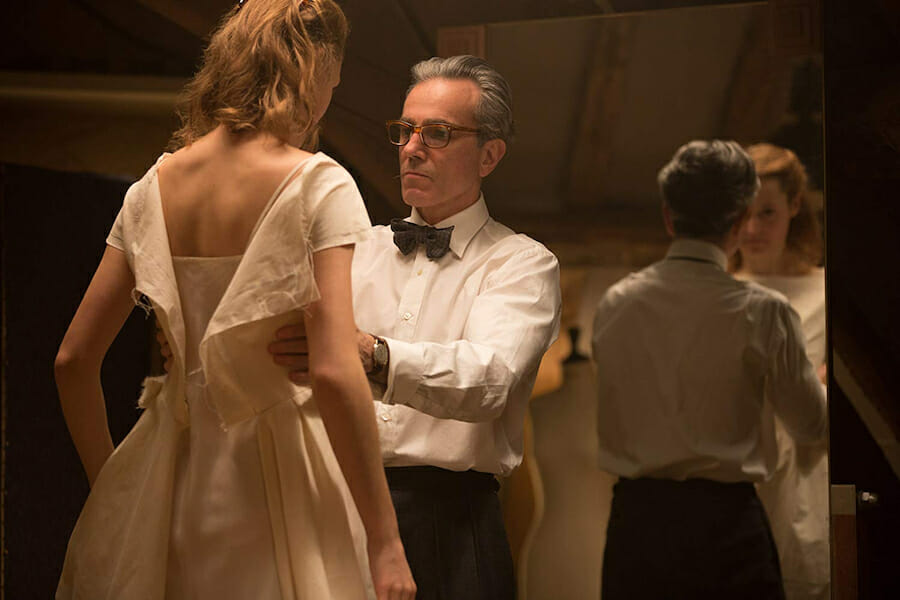
‘Phantom Thread’ Review
There is a certain feeling that envelops me while experiencing exquisite filmmaking. It’s a singular blend of peacefulness and excitement as anticipation of greatness builds in those early scenes. That feeling has rarely swept over me as quickly as the opening moments of Phantom Thread, the latest film from writer/director Paul Thomas Anderson, a six-time Oscar nominee.
We need only watch Reynolds Woodcock (Daniel Day-Lewis) go through his morning ritual to understand that he is a fastidious individual to the point that could easily be described as obsessive-compulsive. Its 1955 London, and this is the House of Woodcock. He lives and works in a home that serves as the canvas for his art, as well as a place to lay his head for sleep. His art is dressmaking. It’s also his obsession and purpose for living. This is the story of a man with transformative talent, who, despite his stated lack of need for those outside his solitary realm, is dragged into the humanity of love and caring.
This is an odd film about odd people. It’s about a dressmaker and it features people making beautiful clothes…yet it’s not a fashion movie. No, this is the study of a genius man and his muse – who is also his lover – and their unconventional saga of love. It’s also a consistently funny movie (and surprisingly so). Evidence that three will always be a crowd, Woodcock’s devoted sister and buttoned-up business partner Cyril (a terrific Leslie Manville) runs a tight ship, while simultaneously using her near preternatural ability to read his moods and idiosyncrasies to respond accordingly. He refers to her as “my old so-and-so” in a way that reflects a lifelong bond unlikely to be broken.
The woman who prevents this from simply being a story of a reclusive genius is the aforementioned muse Alma (played by the effervescent Vicky Krieps). Is she his muse, a model, or his lover? Well, yes to all. And yet those labels fall short in describing the subtleties and nuances of their relationship. When does she play which role in order to maintain the balance so key to his work? Alma is often confused about the best approach in any moment, but she reaches him as none before. When she tells Woodcock that a certain client “doesn’t deserve your dress,” it strikes a chord with him that no one else has ever understood. It’s as close to ‘getting him’ as one can attain.
Ms. Krieps goes toe-to-toe with Daniel Day-Lewis in their scenes. He is simply the greatest living actor, and maybe the best ever at his profession. Her blushy cheeks and determined eye of observation belie an inner strength that isn’t necessarily obvious at first glance. The twist in this “romance” is unlike any other love story from the big screen. While he is haunted by the memories of a cherished mother, Alma presents a more immediate force of reckoning. Is she his tender savior or a menace of danger? It’s fascinating to watch this unfold.
Most know by now that Daniel Day-Lewis has announced this will be his final acting role. We can only compare this to the retirements of Sandy Koufax or Jim Brown. We feel cheated by the void of greatness left by their departures, and if this is truly his final role, the DDL legacy is supremely secure. His meticulous performance shines not only through the quirky OCD moments, but even more so in the seemingly spontaneous moments of bickering and annoyance…moments that come across ad-libbed instead of scripted – these sound (and feel) like real life arguments!
Supposedly, filmmaker Anderson based the character on Spanish-Basque designer Cristobal Balenciaga, and Day-Lewis research added other elements of authenticity. It’s their first movie together since the fantastic There Will Be Blood ten years ago, and theirs seems to be a synchronicity that few actors and directors ever share. Mr. Anderson shot the movie himself, and his use of close-ups – faces, fingers, sewing needles – capture the delicacies, as well as the power. The final piece of this glorious puzzle is the orchestral score provided by Radiohead’s Jonny Greenwood. It’s both prominent and intricate, with stunning piano work that stands on its own. This is a movie about greatness by those who are also great.

